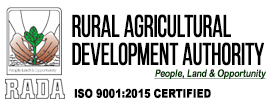FARMER TRAINING
Training farmers is a crucial aspect of promoting sustainable agriculture, improving food security, and enhancing rural livelihoods. The Rural Agricultural Development Authority Along with the Island's Agricultural Schools have produced extension officers who are well equipped to impart knowledge on our farmers in the areas of:
Crop Management:
- Selection of appropriate crops based on climate, soil type, and market demand.
- Soil preparation, planting, and crop establishment techniques.
- Crop nutrition, fertilization, and use of organic matter.
- Irrigation methods and water management.
Pest and Disease Management:
- Identification of common pests and diseases.
- Integrated Pest Management (IPM) techniques.
- Safe and effective use of pesticides, if necessary.
- Cultural practices to prevent pest and disease outbreaks.
Soil Health and Conservation:
- Importance of soil health and its impact on crop yield.
- Soil testing and interpretation of soil analysis reports.
- Soil erosion prevention and conservation methods.
- Practices to improve soil structure and fertility.
Sustainable Farming Practices:
- Organic farming principles and practices.
- Crop rotation and diversification for pest and disease control.
- Agroforestry and intercropping to optimize land use.
- Conservation agriculture techniques, such as no-till farming.
Climate Resilience:
- Understanding climate change and its effects on agriculture.
- Adaptation strategies for changing weather patterns.
- Water-efficient and drought-resistant farming techniques.
Agribusiness and Marketing:
- Basics of farm management and record-keeping.
- Market analysis and value chain understanding.
- Post-harvest handling, storage, and quality control.
- Farm business planning and accessing markets.
Livestock Management:
- Animal husbandry practices for raising healthy livestock.
- Feeding and nutrition of livestock.
- Disease prevention and veterinary care.
Technology and Innovation:
- Introduction to modern agricultural tools and machinery.
- Use of mobile apps and online resources for farming information.
- Precision agriculture techniques for optimizing inputs.
Gender Inclusivity and Social Aspects:
- Empowering women in agriculture.
- Promoting gender equity in decision-making.
- Addressing social issues related to farming communities.
Case Studies and Success Stories:
- Sharing real-life examples of successful farmers who have adopted innovative practices.
- Highlighting local heroes and role models in agriculture.
Field Visits and Practical Demonstrations:
- Organizing farm visits to showcase best practices in action.
- Hands-on workshops for planting, pruning, soil testing, etc.
Safety and Health:
- Farm safety measures and equipment handling.
- Personal protective equipment (PPE) usage.
- Health and hygiene practices in agricultural work.
Community Engagement:
- Building farmer networks and cooperatives.
- Participatory approaches to decision-making and problem-solving.
Continuous Learning:
- Encouraging ongoing learning through workshops, webinars, and access to resources.

